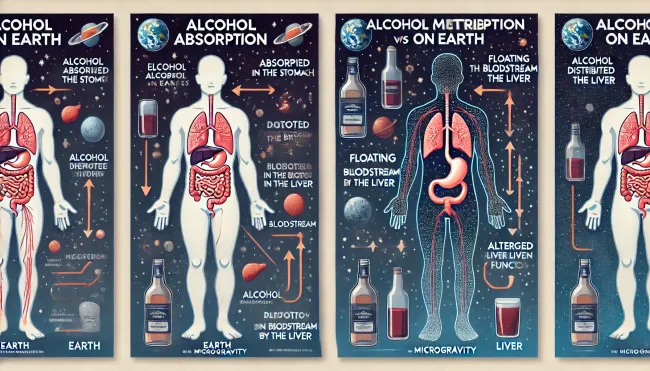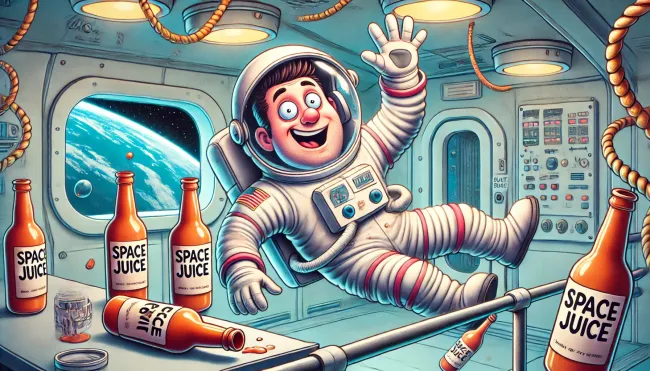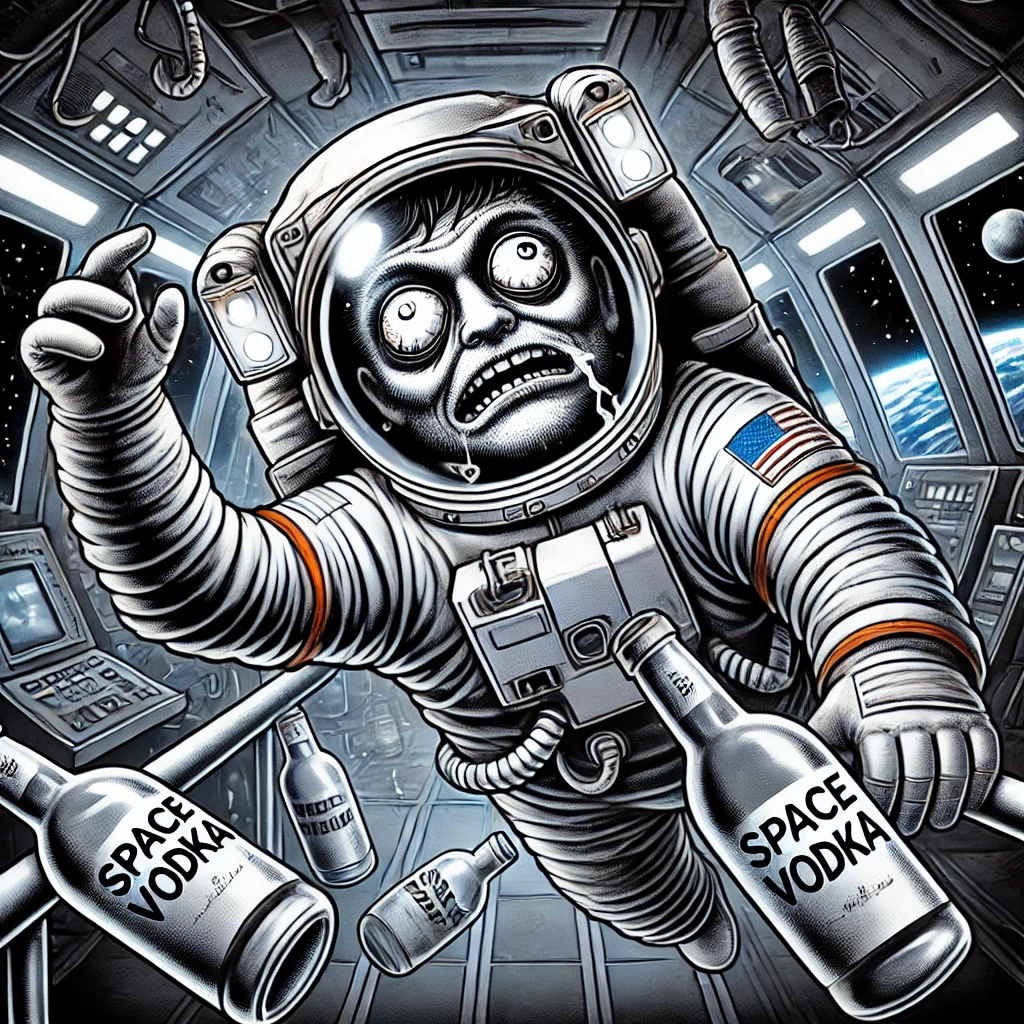With SpaceX and other space agencies pushing us into the new Space Age, it's only a matter of time before someone asks, "Can I get a drink up here?" If flying makes people nervous enough to order a drink, imagine what blasting off into space might do! But getting tipsy in zero gravity? That's a recipe for some out-of-this-world complications.
Drinking alcohol on Earth can be enjoyable, but space presents a unique set of challenges and potential dangers. Here’s how alcohol could affect the human body differently in space and why most space agencies, including NASA, prohibit its consumption on spacecraft and space stations.
Altered Absorption and Metabolism:
Microgravity alters how fluids behave in the human body. Without gravity, liquids, including alcohol, don't settle in the stomach but float and distribute more evenly. This can lead to quicker absorption into the bloodstream, intensifying the effects of alcohol. An astronaut could feel more intoxicated from a smaller amount than on Earth (Lee, 2020).
The liver’s ability to metabolize alcohol may also be impaired in space. On Earth, the liver processes alcohol at a steady rate, but in microgravity, fluid distribution changes could mean alcohol stays in the bloodstream longer, increasing the risk of intoxication (Smith & Anderson, 2019).

Image: A comparison of alcohol absorption and metabolism on Earth versus in microgravity. The infographic illustrates the typical process of alcohol absorption in the human body on Earth, with alcohol moving from the stomach to the bloodstream and then metabolized by the liver, compared to the altered distribution and metabolism in microgravity where alcohol floats more evenly in the bloodstream. (Image generated by OpenAI's DALL·E).
Dehydration:
Alcohol is a diuretic, which increases urine production and can lead to dehydration. In a spacecraft, maintaining hydration is crucial for health and performance. Dehydration impairs cognitive function, reduces physical performance, and increases the risk of kidney stones, already a concern due to microgravity's effects on calcium metabolism. Alcohol could worsen these risks (Smith & Anderson, 2019).
Impaired Judgment and Performance:
Alcohol affects the central nervous system, leading to impaired judgment, coordination, and cognitive function. In space, where precision and quick responses are vital, even slight impairment can have serious consequences. An astronaut under the influence could make critical errors, potentially leading to equipment failure or life-threatening situations (Lee, 2020).
This is why space agencies enforce strict no-alcohol policies to ensure all crew members remain fully capable of performing their duties.
Increased Sensitivity:
Some astronauts report increased sensitivity to alcohol in space, possibly due to altered alcohol processing in microgravity. On Earth, alcohol's effects are predictable based on body weight, tolerance, and amount consumed. In space, these factors might not apply, leading to stronger effects from smaller amounts (NASA, 2021).
This means even a small sip could have a pronounced effect on an astronaut's cognitive and motor functions, complicating the risks of drinking in space.
Potential Interference with Spacecraft Systems:
Spacecraft atmospheres are carefully controlled. Introducing alcohol could interfere with life support systems or other critical equipment. Alcohol vapors could accumulate, posing a fire hazard or affecting sensitive instruments. Spilled liquids could damage electronics or create slip hazards in microgravity (NASA, 2021).

Image: A horizontal, lighthearted cartoon illustration of a tipsy astronaut floating inside a space station. The astronaut is wearing a space suit. (Image generated by OpenAI's DALL-E).
The smell of alcohol could also be off-putting or nauseating in the confined space of a spacecraft, where there is limited opportunity to escape unpleasant odors.
Social and Psychological Effects:
Alcohol might impact social dynamics among crew members, either by relieving stress or causing conflicts and impairing communication. In the close quarters of a spacecraft, maintaining good relationships and effective communication is vital. Alcohol could exacerbate tensions or create new ones, affecting crew harmony and efficiency (Smith & Anderson, 2019).
This is why space agencies emphasize maintaining a sober, professional atmosphere on board.

Official Restrictions:
Most space agencies, including NASA, prohibit alcohol consumption aboard spacecraft and space stations to maintain crew health, safety, and operational readiness. This policy is about preventing intoxication and minimizing any factors that could compromise mission success or crew well-being (NASA, 2021).
Agencies have protocols to manage all aspects of life in space. The alcohol ban is part of comprehensive safety measures designed to protect astronauts and ensure mission success.
The Future of Alcohol in Space: Can We Ever Drink Safely?
As space tourism becomes more viable, rules around alcohol in space might change. Companies like SpaceX, Blue Origin, and Virgin Galactic are pioneering commercial space travel, where traditional restrictions might not apply. Future space tourists might want to celebrate with a glass of champagne or enjoy a cocktail while orbiting Earth.
However, the challenges of alcohol in space will require new guidelines to ensure safety. Innovations in packaging and consumption will be necessary to adapt to microgravity and prevent spills or other issues. Companies are exploring possibilities; for example, in 2019, Japanese whisky maker Suntory sent whisky samples to the ISS to study how aging in space affects flavor. This experiment, though scientific, opens the door to future possibilities for space tourism and alcohol (Suntory, 2019).

Generated image. A conceptual image of a future space tourist enjoying a glass of champagne in zero gravity while admiring the view of Earth from a luxurious space station. The scene captures a sophisticated atmosphere with modern design elements and a stunning view of Earth’s blue oceans and white clouds. (Image generated by OpenAI's DALL·E).
So...:
Getting drunk in space might seem fun, but it's fraught with risks. From altered absorption and metabolism to impaired judgment and interference with spacecraft systems, the effects of alcohol are unpredictable and potentially dangerous. Until we better understand how to manage these risks, alcohol will likely remain off-limits in space. But as our understanding of space evolves, perhaps one day we’ll enjoy a cocktail while orbiting Earth.
Article Sources
Lee, H. (2020). Human physiology in space. Academic Press.
NASA. (2021). Alcohol and Space: The definitive guide. Retrieved from https://www.nasa.gov/
Smith, J. D., & Anderson, R. T. (2019). Space medicine: Understanding human health in microgravity. Springer.
Suntory. (2019). Whisky in space: Aging experiment on the ISS. Retrieved from https://www.suntory.com/


![OpenAI. (2024). Tipsy astronaut floating inside a space station [AI-generated image]. OpenAI DALL·E.](/sites/default/files/styles/max_650x650/public/2024-08/DALL%C2%B7E%202024-08-24%2016.31.30%20-%20A%20horizontal%2C%20lighthearted%20cartoon%20illustration%20of%20a%20tipsy%20astronaut%20floating%20inside%20a%20space%20station.%20The%20astronaut%20is%20wearing%20a%20space%20suit%20with%20the%20h.webp?itok=f1jUo4io)
